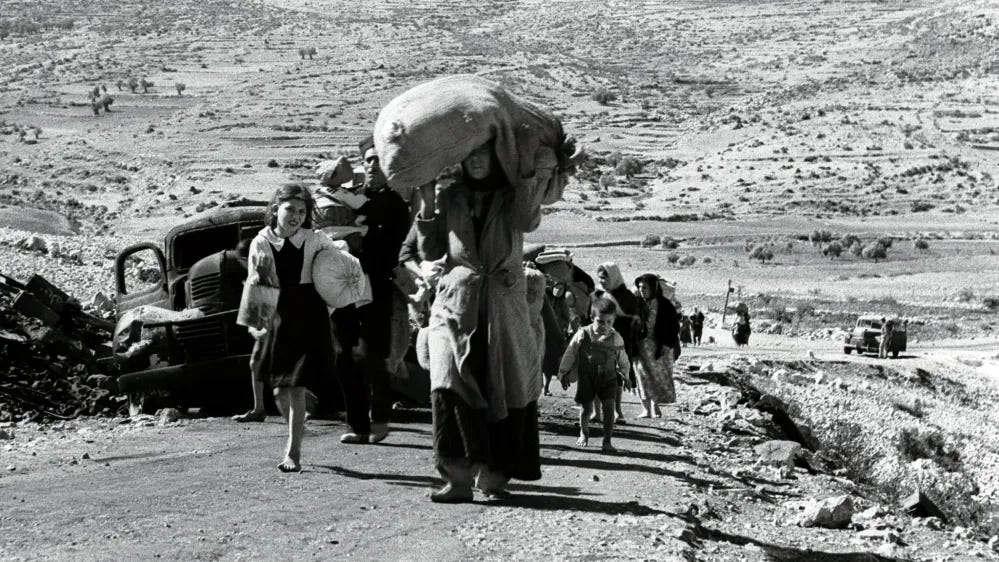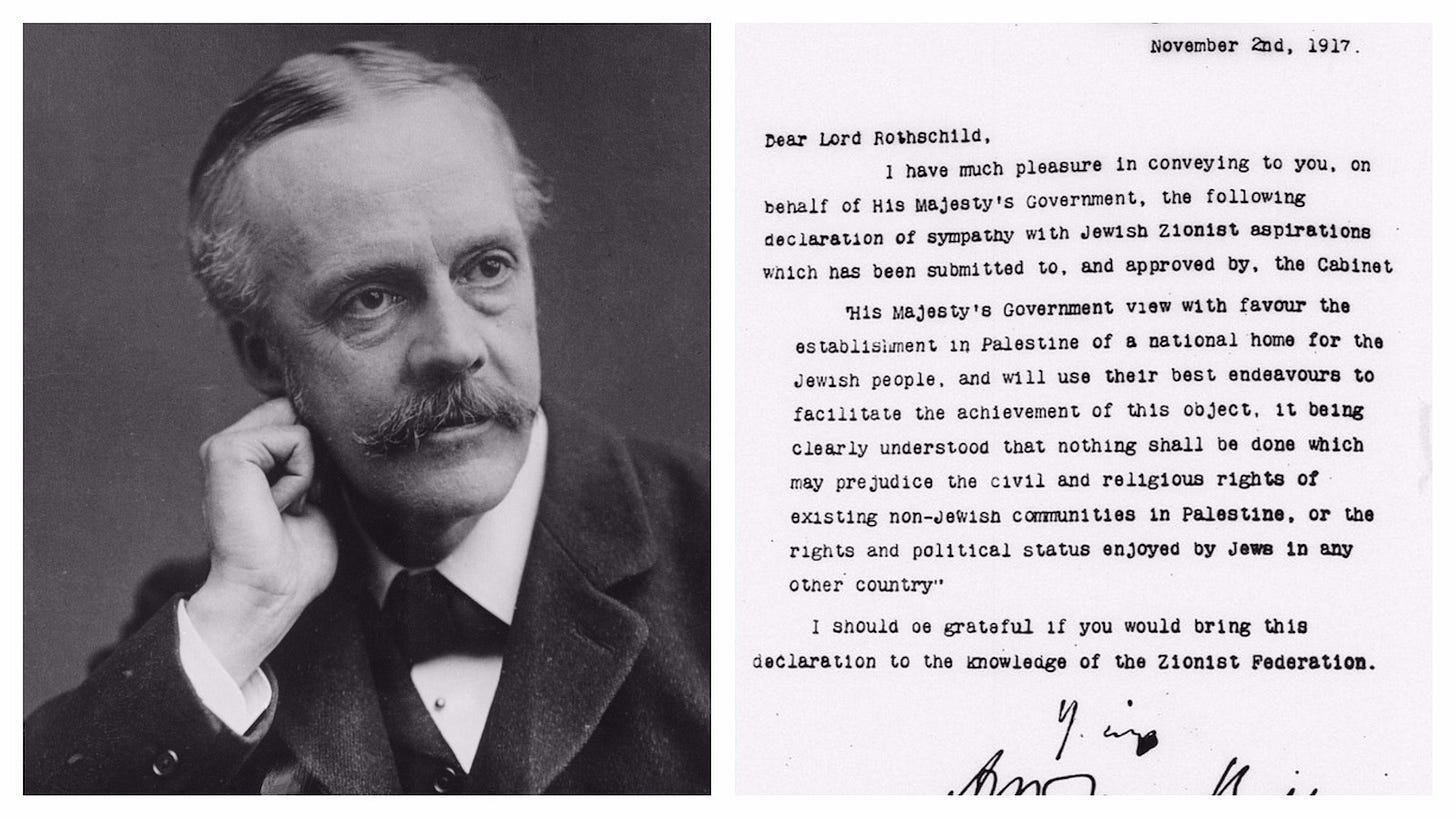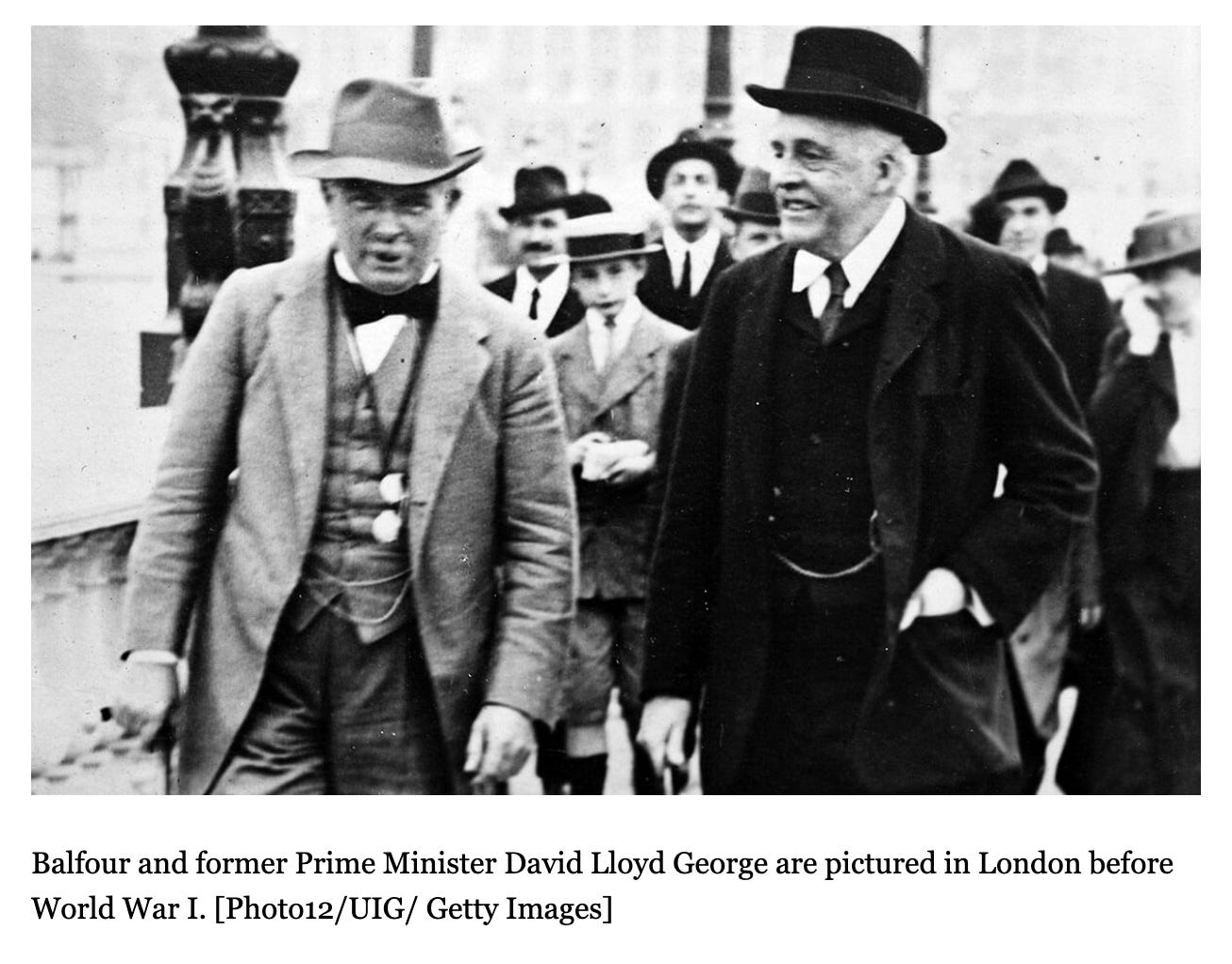The Balfour Declaration: A License Given to Zionists to Ethnically Cleanse Palestine of Arabs
How a Single Document from the British Shaped a Century of Strife
The annals of Palestine's lineage are steeped in antiquity, entwined within a labyrinthine tapestry unfurling across the vast expanse of over 3,000 years. Its genesis harks back to the biblical era when the land bore the appellation of Canaan, a pivotal stage upon which the sagas of numerous prophets and the Israelites themselves were enacted. A momentous milestone was etched when the biblical King David anointed Jerusalem as the epicenter of his dominion.
The historical precincts of Canaan encompassed territories now denoted as modern-day Israel, the Palestinian Territories, segments of Lebanon, and fragments of Jordan and Syria. Canaan is most distinguishably celebrated for its affiliation with the Canaanites, who held dominion over these lands during antiquity. Through the eons, Canaan bore witness to a succession of invasions and dominions under disparate auspices, including the aegis of the Egyptians, Hittites, and Israelites, each of which indelibly imprinted its annals.
The arrival of the Israelites in Canaan stands as a pivotal chapter within the biblical narrative. As per scriptural annals, guided by the prophet Moses, the Israelites emancipated themselves from the shackles of Egypt, embarking on an odyssey of exodus, buoyed by celestial providence. Following a meandering traverse through the wilderness spanning four decades, their journey culminated at the fringes of Canaan, a promised realm bequeathed to them by their divine patron.
The subjugation of Canaan, frequently ascribed to the agency of Joshua, encapsulated the realization of this sacred covenant, with the Israelites staking their claim on this newfound homeland. The biblical chronicle narrates their advent as a consequence of celestial intervention, setting the stage for the inauguration of the Kingdom of Israel within Canaan's bounds, a quintessential fragment of the venerable Israelite historical and spiritual heritage.









In the ensuing centuries, the annals of Palestine bore witness to the ebb and flow of mighty empires, including the Assyrians, Babylonians, Persians, and Greeks. Nevertheless, it was beneath the dominion of the Roman Empire that a momentous turning point was etched into history. This juncture materialized with the eruption of the Jewish Revolt, culminating in the cataclysmic annihilation of the Second Temple in the year 70 CE.
Subsequently, during the 2nd century CE, the Roman Emperor Hadrian enacted the expulsion of Jews from Jerusalem and affixed a new nomenclature upon the region, bestowing upon it the appellation "Palaestina." This name was derived from the Philistines, an ancient civilization that had once inhabited the coastal peripheries.
This transformative act bore immense consequences, initiating a profound transformation in the demography and political ethos of the territory, ultimately laying the foundation for the intricate and enduring narrative that continues to underpin the modern Israeli-Palestinian discord.
Read more: “A History of Palestine: From the Ottoman Conquest to the Founding of the State of Israel" by Gudrun Krämer
The Balfour Declaration: Its Genesis, Controversies, and Reverberations
The Balfour Declaration, an instrumental document in the annals of the Israel-Palestine discord, represents a terse proclamation, comprising a mere 67 words, yet bearing profound and enduring ramifications. Originating from the British government amidst the backdrop of World War I, it articulated an endorsement for the creation of a "national domicile for the Jewish populace" within the confines of Palestine. Throughout the passage of time, this declaration has persisted as a wellspring of contention, animosity, and division.
What is the Balfour Declaration?
The Balfour Declaration, christened in honor of Arthur James Balfour, the British Foreign Secretary who penned this epistle, materialized as a missive dated November 2, 1917. Directed to Lord Walter Rothschild, a prominent figure within the British-Jewish community and an ardent advocate of Zionism, its contents elucidated:
"His Majesty's Government views with favor the establishment in Palestine of a national home for the Jewish people, and will use their best endeavors to facilitate the achievement of this object, it being clearly understood that nothing shall be done which may prejudice the civil and religious rights of existing non-Jewish communities in Palestine or the rights and political status enjoyed by Jews in any other country."
This declaration signified the maiden official British pronouncement in favor of Jewish migration to Palestine, consequently establishing the underpinnings for the eventual emergence of the State of Israel.
Who was behind the Balfour Declaration?
The Balfour Declaration did not materialize in isolation; it evolved as a result of diverse factors, influential individuals, and mounting pressures. Several key figures assumed pivotal roles in its composition:
Arthur James Balfour, the British Foreign Secretary during that era, stood as the principal architect and advocate of the declaration. His motivations encompassed a multifaceted amalgamation, underscored by religious convictions, the shroud of anti-Semitic tropes, and strategic contemplations concerning British vested interests in the Middle East.
As an ardent adherent of Christianity, Balfour's personal beliefs wielded significant influence in molding his posture toward the Zionist movement. His faith in the scriptural ties binding Jews to the hallowed terrain of Israel served as an immutable cornerstone in his determination to champion the cause of a Jewish homeland in Palestine.
A notable example of this influence can be found in Balfour's letter to Lord Curzon, the then-Viceroy of India, where he stated,
"In Palestine, we do not propose to go through the form of consulting the wishes of the present inhabitants of the country... Zionism, be it right or wrong, good or bad, is rooted in age-long traditions, in present needs, in future hopes, of far profounder import than the desires and prejudices of the 700,000 Arabs who now inhabit that ancient land."
In this statement, Balfour's personal beliefs and the British government's colonial attitudes toward the indigenous population of Palestine are evident.
Lord Walter Rothschild, a preeminent British-Jewish luminary and fervent Zionist, held the distinction of being the designated recipient of this declaration. His sway and network of associations played an indispensable role in procuring its issuance. Lord Rothschild enjoyed prominence within the British-Jewish community and garnered renown for his extensive involvement in beneficent and political endeavors. He maintained close affiliations with pivotal Zionist leaders, adroitly leveraging these connections to advance the Zionist cause within the United Kingdom.
Chaim Weizmann, a luminary in the domain of chemistry and a stalwart Zionist, was ceaselessly engaged in lobbying efforts within the United Kingdom, adeptly tilting the British government's stance towards the endorsement of the Zionist crusade. Weizmann's endeavors bore substantial weight in molding British policy concerning Zionism. Notably, he was not solely a scientist but also a proficient diplomat, wielding influence over influential British statesmen. Weizmann's interactions with key figures in the British political landscape, including Balfour, played a pivotal role in reshaping the British government's position to bolster the Zionist movement.
The dedication of Chaim Weizmann to the Zionist cause and his sway within the British government are manifest in the fact that, subsequent to the establishment of the state, he ascended to the position of the first President of Israel in 1949.
The broader Zionist Movement, personified by entities like the World Zionist Organization, assumed a pivotal role in shaping the milieu that culminated in the Balfour Declaration. The Zionist movement, under the leadership of luminaries such as Theodor Herzl and others, had diligently and unwaveringly lobbied for the realization of a Jewish homeland over the course of numerous years.
A striking exemplar of this influence is embodied in the diplomatic endeavors spearheaded by Chaim Weizmann, acting as an envoy for the Zionist movement, to establish linkages and coalitions within the British government. His extensive negotiations and persuasive endeavors within the echelons of British political circles, involving key figures like David Lloyd George, held a pivotal position in steering British policy toward bolstering the Zionist cause.
Why was it issued?
The issuance of the Balfour Declaration can be attributed to various factors and motivations:
Strategic Interests: From a British vantage point, the declaration was perceived as a strategic maneuver designed to safeguard British interests in the Middle East. The British government surmised that by endorsing Zionism, they could cultivate goodwill among Jewish communities globally, particularly in the United States and Russia.
Religious Beliefs: Certain influential figures within the British government, Arthur Balfour among them, were swayed by religious convictions and upheld the notion of Jews' biblical connection to the land of Israel.
Zionist Lobbying: The persistent lobbying endeavors of Chaim Weizmann and the burgeoning influence of the Zionist movement in the United Kingdom played an indispensable role in persuading the British government to issue the declaration.
Encouraging Jewish Immigration: The declaration held the objective of stimulating Jewish immigration to Palestine, perceived as a means to stabilize the region and counterbalance the sway of Arab nationalism.

Why was it controversial?
The Balfour Declaration, marked by a concise 67-word statement, engendered substantial controversy for several compelling reasons:
Palestinian Rights: Palestinians perceived the declaration as a disregard for their rights in the pursuit of Zionist ambitions. While it pledged to safeguard the "civil and religious rights of existing non-Jewish communities in Palestine," it conspicuously omitted any reference to the political rights of the native population. This omission raised grave concerns among Palestinians, suggesting a disregard for their right to self-determination and sovereignty within their ancestral land. The declaration, in essence, endorsed the concept of a Jewish national home without defining the extent of Palestinian self-determination or political involvement in the envisioned future of Palestine.
Lack of Consultation: The British government issued the declaration without consulting the Palestinian population, fostering a perception of colonial arrogance and indifference to the aspirations of a people who had resided in the region for generations. This act mirrored the colonial mindset of the era, in which imperial powers determined the destinies of indigenous peoples without their consent or participation in the decision-making process. Palestinians were never given the opportunity to voice their opinions on the matter, intensifying a sense of injustice and disregard for their rights.
Contradictory Promises: The declaration harbored internal contradictions that exacerbated its controversy. While it expressed support for a "national home for the Jewish people" in Palestine, it also guaranteed the preservation of the "civil and religious rights of existing non-Jewish communities in Palestine." This inherent contradiction sparked inquiries about the practical realization of the declaration and whether it was feasible to establish a Jewish national home while simultaneously safeguarding the rights of the non-Jewish populace. Critics contended that these commitments were fundamentally incompatible, and the lack of clarity on how to strike this balance deepened the controversy.
Imperial Interests: The timing of the declaration during World War I nurtured suspicions that it was a political maneuver aimed at securing Jewish support in the war and asserting British dominance in the Middle East. Some critics posited that it was a strategic ploy by the British government to gain the backing of Jewish communities worldwide, especially in the United States and Russia, to solidify British control in the Middle East. During the war, various powers courted influential groups, and the British government perceived advantages in aligning with the Zionist movement. This suspicion of ulterior motives further inflamed the dispute surrounding the declaration, with many questioning whether the British government's support for Zionism was predominantly a tactical maneuver rather than a sincere commitment to the Zionist cause.
Anti-Semitic Stereotypes: A highly contentious facet of the Balfour Declaration was the personal beliefs of Arthur Balfour, the British Foreign Secretary responsible for its authorship. Balfour's views on Jews and Judaism were influenced by anti-Semitic stereotypes prevalent in Europe at that time. In his correspondence and statements, Balfour expressed convictions that ascribed unique characteristics to Jews and a distinctive historical link to the land of Palestine, rooted in biblical narratives. These views, although reflective of the prevailing attitudes of the era, were grounded in stereotypes and misconceptions of Jewish identity, deepening the controversy surrounding the declaration.
For example, Balfour wrote to Lord Curzon, the then-Viceroy of India, stating,
"In Palestine, we do not propose to go through the form of consulting the wishes of the present inhabitants of the country... Zionism, be it right or wrong, good or bad, is rooted in age-long traditions, in present needs, in future hopes, of far profounder import than the desires and prejudices of the 700,000 Arabs who now inhabit that ancient land."
This statement unveiled Balfour's perspective, wherein he regarded the Zionist endeavor as being of greater importance and merit than the rights and aspirations of the Palestinian Arab populace. Such views, steeped in stereotypes and an apparent lack of regard for the Palestinian people, significantly contributed to the contentious nature of the Balfour Declaration.
How was it received by Palestinians and Arabs?
The Balfour Declaration encountered vehement opposition from Palestinians and Arab leaders, who regarded it as a profound betrayal of their rights and interests:
Palestinian Discontent: Palestinian Arabs vehemently opposed the declaration, viewing it as a breach of commitments made during the Arab Revolt against the Ottoman Empire. At that time, they had been encouraged to rise against Ottoman rule with the promise of gaining independence.
During World War I, the British government had urged Arab leaders, such as Sharif Hussein of Mecca and Emir Faisal of the Hejaz, to rebel against Ottoman authority with the assurance of Arab sovereignty. Arabs were led to believe that their support for the British war effort would secure their right to self-determination and self-rule.
Nevertheless, the issuance of the Balfour Declaration while the Arab Revolt was still ongoing represented a stark deviation from these assurances. Palestinians and Arab leaders felt that their sacrifices and contributions to the war effort were being overlooked and that their dreams of independence were being sidelined in favor of Zionist interests. The glaring contradiction between the pledges to Arab Revolt leaders and the endorsement of a Jewish national home was a wellspring of profound resentment and opposition among Palestinians and Arab nationalists.
Arab Nationalism: The declaration served to exacerbate Arab nationalist sentiments, instigating a burgeoning resistance movement and escalating tensions in the region.
The declaration was perceived as a direct affront to the aspirations of Arab nations, fostering a collective sense of identity and resistance among Arab populations. Arab leaders and intellectuals recognized the necessity of uniting in response to perceived threats to their sovereignty and self-determination.
This development heralded the rise of Arab nationalist movements, exemplified by the Arab Revolt against Ottoman rule, which aimed to achieve Arab independence and self-governance. The dispute over the Balfour Declaration became a central catalyst for the growth of Arab nationalism and the repudiation of foreign interference in the affairs of Arab nations.
Furthermore, the declaration exacerbated tensions in the region, as the conflicting interests of Jewish and Arab communities in Palestine intensified. The emergence of nationalist movements on both sides set the stage for decades of strife and competition for control of the land.
Opposition from Arab Leaders: Prominent Arab leaders, including Emir Faisal of the Hejaz and Sharif Hussein of Mecca, vociferously articulated their strong objections to the declaration and its implications for Arab sovereignty.
The dissent of these influential Arab leaders presented a significant challenge for the British government, eroding the credibility of the declaration and underscoring the dissonance between the assurances provided to Arab leaders and the endorsement of the Zionist cause.
Who else was behind it?
In addition to the British government and the prominent figures mentioned earlier, various external influences and interests contributed to the issuance of the Balfour Declaration:
Zionist Organizations: The World Zionist Organization, under the leadership of Theodor Herzl and other influential figures, played an indispensable role in promoting the Zionist cause and advocating for international recognition of a Jewish homeland in Palestine. The organization engaged in diplomatic initiatives, lobbying endeavors, and outreach to garner support for the Zionist movement.
Jewish Diaspora: The global Jewish diaspora, especially in the United States and Russia, featured influential individuals and organizations staunchly supporting the Zionist cause. These influential Jewish communities played a pivotal part in advocating for the establishment of a Jewish homeland in Palestine.
International Factors: The geopolitical landscape during World War I and the aspiration to secure Jewish support in various nations significantly influenced the British government's decision to promulgate the declaration. The British government perceived potential advantages in aligning with the Zionist movement to secure the backing of influential Jewish communities, particularly in the United States and Russia.
What impact did it have on Palestinians?
The Balfour Declaration had a profound and lasting impact on the Palestinian people:
Displacement and Dispossession: The Balfour Declaration initiated a process of Jewish immigration to Palestine, ultimately resulting in the displacement and dispossession of Palestinian Arabs from their ancestral lands and homes. The arrival of Jewish immigrants, facilitated by the British mandate, led to demographic shifts and land acquisition by Jewish settlers, often to the detriment of Palestinian Arab rights.
Conflict and Tensions: The Declaration exacerbated existing tensions between Jewish and Arab communities in Palestine and sowed the seeds of long-standing conflict. The clashing interests and ambitions of both groups, compounded by the demographic changes driven by Jewish immigration, created a volatile environment.
Loss of Sovereignty: Palestinians experienced a profound sense of diminished sovereignty and agency in shaping their future due to the declaration. It was issued without the consent of the Palestinian population and instigated a series of events that would significantly influence the region's destiny.
Ongoing Conflict: The unresolved issues stemming from the Balfour Declaration continue to stoke the flames of the Israeli-Palestinian conflict, rendering it one of the world's most intransigent disputes.
This conflict has yielded far-reaching consequences, impacting the lives of millions and molding the political landscape of the Middle East. It has also been a focal point of international concern and diplomatic endeavors aimed at finding a resolution.
The Nakba

The Nakba, which translates to "The Catastrophe" in Arabic, denotes the significant and agonizing events that transpired in Palestine in 1948. It symbolizes the coerced expulsion and dispossession of hundreds of thousands of Palestinian Arabs from their homes and lands during the establishment of the State of Israel.
The Nakba emerged as a result of a confluence of factors, including the 1948 Arab-Israeli war, international political determinations, and the massive influx of Jewish immigrants to the region. The aftermath was a profound humanitarian tragedy, with Palestinian families torn apart and their communities shattered. Many of the displaced Palestinians transformed into refugees, seeking sanctuary in neighboring countries, while others remained in parts of historic Palestine, enduring a life of displacement and statelessness.
The Nakba remains a pivotal and highly contentious matter in the Israeli-Palestinian conflict, shaping both the collective historical memory and the ongoing pursuit of justice and resolution in the region.
Legacy of the Balfour Declaration
The Balfour Declaration, issued more than a century ago, continues to cast a long and intricate shadow over the Israeli-Palestinian conflict and the broader Middle East. Its legacy is multifaceted and has far-reaching implications that resonate throughout the political, social, and cultural landscapes.
Formation of the State of Israel: The Balfour Declaration laid the groundwork for the eventual establishment of the State of Israel in 1948. The declaration's endorsement of a Jewish national home in Palestine served as the basis for international recognition of Israel's statehood.
Ongoing Conflict: The legacy of the Balfour Declaration is profoundly entwined with the Israeli-Palestinian conflict, one of the world's most persistent and intractable conflicts. The issues of displacement, dispossession, competing national narratives, and territorial disputes continue to mold the dynamics of the conflict.
Displacement of Palestinians: The declaration played a pivotal role in the displacement and dispossession of Palestinian Arabs from their lands and homes. The unresolved issue of Palestinian refugees remains a central facet of the conflict's legacy.
Palestinian Statehood: The legacy of the Balfour Declaration encompasses the ongoing struggle for Palestinian statehood and self-determination. The declaration's omission of Palestinian political rights remains a central point of contention in peace negotiations and diplomacy.
Regional Instability: The Israeli-Palestinian conflict, rooted in the legacy of the Balfour Declaration, has contributed to regional instability and tensions in the Middle East. The conflict's enduring nature and its impact on neighboring countries underscore the wider repercussions of the declaration.
Global Diplomacy: The Balfour Declaration has been a topic of international diplomacy and efforts to resolve the Israeli-Palestinian conflict. It has been referenced in numerous United Nations resolutions, peace initiatives, and negotiations.
The Balfour Declaration, issued during the tumultuous period of World War I, remains a pivotal document in the history of the Middle East. Its complex legacy is marked by ongoing conflict, unresolved grievances, and the pursuit of self-determination by both Israelis and Palestinians. As the Israeli-Palestinian conflict endures, the Balfour Declaration remains a focal point in discussions about its historical roots and potential paths toward resolution. Its enduring impact serves as a reminder of the intricate and deeply rooted issues that continue to shape the region's destiny.
Share this story and Join us in the chat!
If you enjoyed this story, share it with a friend and share your thoughts and questions in the Chat.
Copyright RAISINI 2023. Any illegal reproduction of this content will result in immediate legal action.












How things begin are important. Once again, the arrogance of white men seems to have been part of the mix. This is only one quote from a long article about a complicated time and the even more complicated result.
"In Palestine, we do not propose to go through the form of consulting the wishes of the present inhabitants of the country... Zionism, be it right or wrong, good or bad, is rooted in age-long traditions, in present needs, in future hopes, of far profounder import than the desires and prejudices of the 700,000 Arabs who now inhabit that ancient land." -- letter from Arthur James Balfour, the British Foreign Secretary to the then-Viceroy of India.
Jews were already living in British Mandated Palestine during the Balfour declaration. They were Jewish Palestinians. Jerusalem was 80% Jewish. Today it’s 60% Jewish. The Jews who emigrated since WWII did not usurp land from Arabs. The Jews worked to rent or buy land and homes.